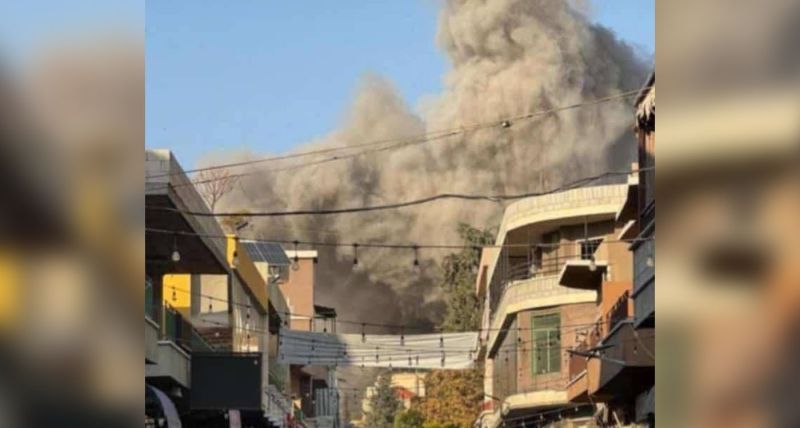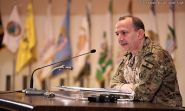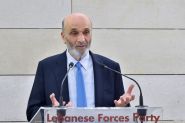
The Secretary-General of Hezbollah, Naim Qassem, confirmed on Wednesday that his organization has expanded and enhanced its arsenal since the end of the 2006 war, in violation of UN Security Council Resolution 1701.
Naim Qassem announced that Hezbollah is ready to accept “conditional” indirect negotiations between Beirut and Tel Aviv “if the Israeli enemy ends its aggression against Lebanon.” He also demanded that the Lebanese Army and UNIFIL, especially the German naval contingent, “provide explanations about the Israeli commando operation in Batroun.” However, the most significant point in his speech was his acknowledgment that Hezbollah violated Security Council Resolution 1701, working to expand its arsenal and train its fighters since the end of the July 2006 war in preparation for the next confrontation with Israel.
In his speech marking the 40th day since the assassination of former Hezbollah leader Hassan Nasrallah, who was killed on September 27 in an Israeli airstrike on the southern suburbs of Beirut, Naim Qassem primarily delivered words intended to uplift the morale of his troops and reassure his supporters of a “certain victory” against the Israeli war machine.
Nevertheless, starting from flawed assumptions weakens the subsequent argument. The Hezbollah leader briefly dismissed the reasons why Israel launched a destructive war against its strongholds in Lebanon, only to focus—once again—on hypothetical Israeli expansionist ambitions, which, in his view, drove Hezbollah to arm itself after 2006. In other words, Naim Qassem expects the Lebanese to forget that it was his organization that initiated attacks against Israel over a year ago by opening the southern front to support the Palestinian Hamas in its war with Israel, ignoring warnings from Tel Aviv, which had repeatedly stated it did not want a war on its northern border but would not stand idly by if Hezbollah continued its attacks on its northern regions.
Naim Qassem wants the Lebanese people to focus on the specter he crafted and attempts to implant in their minds: a supposed “remaking of the Middle East,” as justification for a war into which Hezbollah led the country without consulting its citizens and despite the fact that several Arab nations normalized relations with Israel.
“It is no longer important to know how the war started and for what reasons. What matters is that we are facing Israeli aggression. Israeli Prime Minister Benjamin Netanyahu said after his meeting with US envoy Amos Hochstein, ‘I don’t know when the war will end, but I have set specific goals for victory. We will change the face of the Middle East,’” said Qassem, explaining that, to accomplish this, Israel seeks to “destroy Hezbollah, occupy Lebanon—even if only remotely through aerial surveillance (alluding to Tel Aviv's proposal to monitor the potential implementation of Resolution 1701)—to turn it into a new West Bank, and work on establishing a new regional map.” For this reason, he claimed, Hezbollah began preparations immediately after the 2006 war, arming itself, recruiting and training fighters, and developing its capabilities across all areas. Consequently, today, Hezbollah is in a position of legitimate defense against Israeli aggression and expansionist plans, he argued.
He attempted to justify the fact that many villages south of the Litani River have turned into weapons depots and storage centers, in violation of Resolution 1701, as have neighborhoods in Beirut’s southern suburbs and towns in the Beqaa Valley. According to him, in this war with Israel, “the battlefield will decide,” because, in his perspective, “the enemy’s strengths will not secure its victory against the Resistance.” He emphasized that Hezbollah’s fighters adhere to “a firm and unshakable Islamic doctrine they uphold no matter what, and for which they are willing to die. Martyrdom does not mean one wants to die, but that one is not afraid of death on the battlefield,” he said, stressing that Hezbollah “has tens of thousands of fighters unafraid of dying,” and that its military capabilities remain “strong and renewable,” while the enemy’s advantages lie in “its ability to destroy, kill civilians, its air power, and communications control.” However, “the five brigades deployed on the border have not achieved Israel’s objectives,” he assessed.
Based on this premise, he concluded that “the battlefield and the Israeli home front will determine the outcome, as missiles and drones will reach every part of Israel, making people scream as they face the true cost of this war.” “Israel will come to realize that it cannot win,” said Naim Qassem. “With its 65,000 soldiers, it could have reached the Litani, but it has not managed to do so because it faces staunch resistance,” he said, reiterating that Hezbollah is not “begging for a ceasefire.” However, he added, “if the enemy decides to end the fighting, we have outlined a clear path for indirect negotiations through the Lebanese state and the Speaker of the Parliament, Nabih Berri, who stands as the flag-bearer of political resistance.” According to him, “any negotiations must be based on two principles: ending hostilities and fully preserving Lebanese sovereignty.”
In this context, Sheikh Qassem also referenced last Friday’s Israeli commando operation, which raises many questions. “I do not wish to accuse anyone, but I am asking the army, responsible for border protection, to clarify in a statement how this violation of Lebanese sovereignty occurred—even if it means saying that they could not prevent it. UNIFIL should also provide details, particularly the German contingent: What did they witness that night? What did they do?”
He concluded his speech with yet another promise of certain victory. Notably, Qassem’s message was pre-recorded rather than a live broadcast, as he referred to the potential impact of the US presidential election on the continuation of the war, saying, “regardless of the candidate who will be elected,” even though Donald Trump's victory had already been confirmed.



Comments